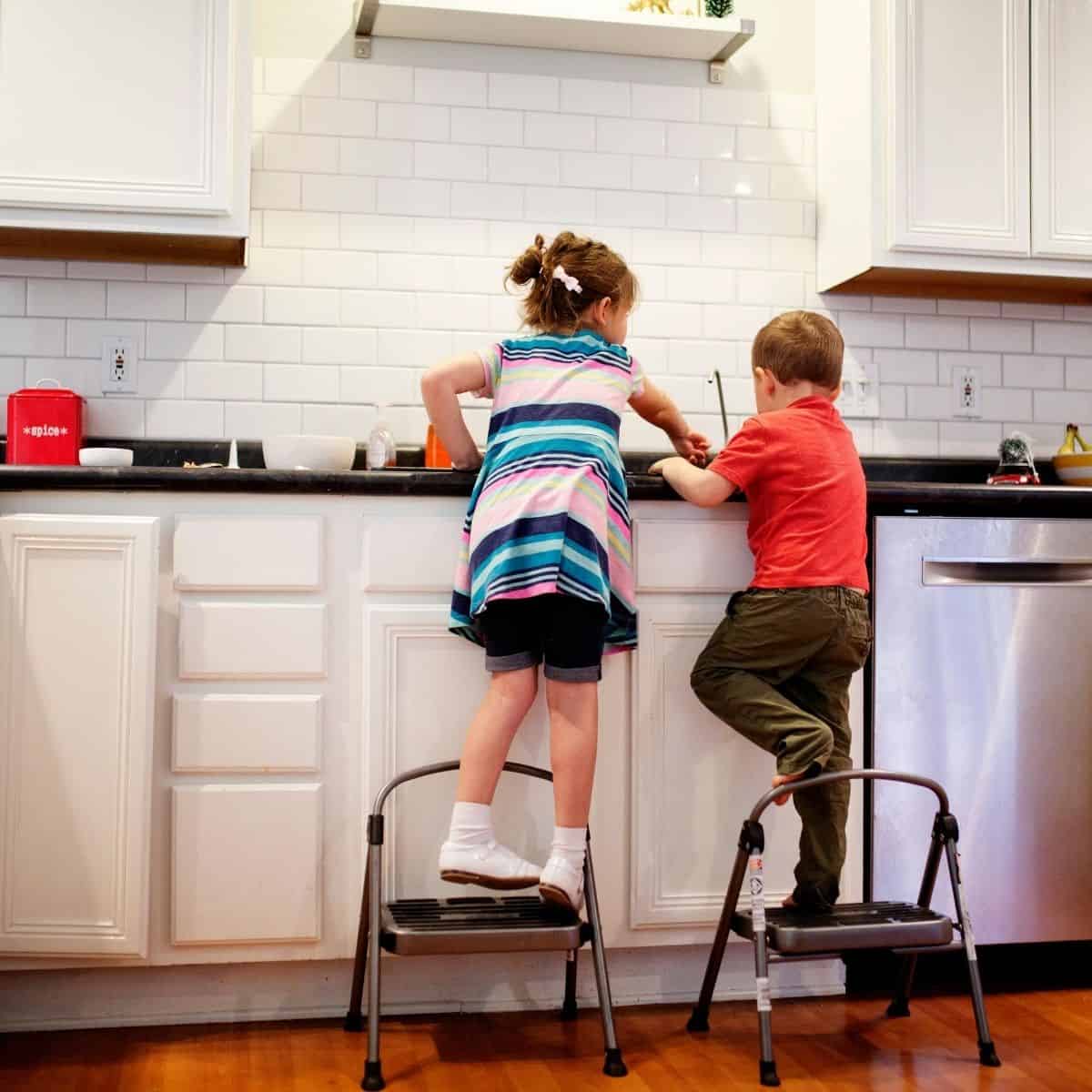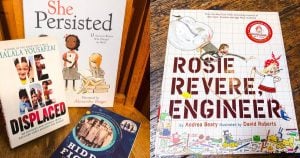We can be honest with each other, right?
Isn’t one of the best things about having kids the idea that one special day you’ll be able to look at them and say things like:
- “You’re in charge of dishes tonight!”
- “Don’t forget to take out the trash!”
- “Did you feed the dog?”
- “You need to clean the bathroom before you leave!”
And just like that, you’ve relinquished some of your own household duties to your family’s younger members. You’ll finally have a few extra minutes for that book you’ve been trying to read since they were born, and maybe you’ll reduce a little bit of your parenting anxiety.
But when are chores for kids actually acceptable?

This site contains affiliate links, meaning that we earn a small commission for purchases made through our site. We only recommend products we personally use, love, or have thoroughly vetted.
- When Can Kids Start Doing Chores?
- Why is it Important to Assign Chores for Kids?
- Age-Appropriate Chores and Allowance: Should You Pay Your Kids for Chores?
- Assigning the Right Types of Chores By Age
- How to Make a Chore Chart for Kids
- Are You Looking for a Printable Chore List?
- Find the Right Way to Implement Chores for Kids in Your Family
When Can Kids Start Doing Chores?
More importantly, when are our children physically and mentally capable of completing the tasks at hand? When is it okay to start teaching your kids about contributing to the family through chores?
Luckily for us, professionals like the American Academy of Childhood and Adolescent Psychiatry have done the necessary research to help us understand the right chores by age for our little ones.
From picking up toys to mowing the lawn, there actually is rhyme and reason to explain what your children can do, starting from age 2 and beyond. Let’s get into it so that you can pick up that book, shall we??
Why is it Important to Assign Chores for Kids?
Aside from wanting to put an end to that whole “overwhelmed mom who does nothing but housework” thing, there are benefits to assigning chores for kids.
Here are just a few of them:
1. Teaching Responsibility
As children grow, it’s essential to teach them lessons in responsibility. Chores can play a significant role in this process.
For example, even at a young age, if a child refuses or forgets to pick up their toys and can’t find something later, they will learn the cause and effect of their own actions.
Kids learn by doing, and in some cases, not doing and reaping the consequences.
2. Confidence and Self-Worth
While our kids might not always like being asked to do a chore around the house, there’s usually a sense of pride that comes with a job well done. Think about how much toddlers love to help, and how happy it makes them when you congratulate their job well done.
When you teach your children to help, you also prove their own abilities, helping them understand all they’re capable of.
My Experience
Take my daughter, for instance – she has a serious problem with cleaning up the playroom.
While she lives for the opportunity to make a mess, like most kids, she acts as if I’m torturing her when I tell her she needs to pick up after herself.
And regretfully, I used to be “that mother” who would eventually fold and do the job myself.
I began to see, though, that this was not teaching my child anything, except that I was a sucker.
I started making “somewhat” idle threats about throwing toys away, and my beloved daughter suddenly decided cleaning wasn’t so bad after all.
I’ll never forget the look on her face the first time she cleaned the room all on her own. She was glowing with pride and anxious to do more, just to prove to me, and herself, that she could.
3. Life Skills
As much as we parents like to pretend our children will stay safely at home with us forever, the day will come that they’ll want to move out.
By assigning the right types of chores by age, they’ll learn important life skills that will come in handy during their first ventures into the world of independent living.
Except for my children, of course, who have already agreed to let me accompany them to college (I’m considering getting this drafted into a legal contract!).
Teaching older children to do things like laundry, for instance, is essential. Don’t pretend you don’t know “that person” in college who had no idea how to do their laundry.
Age-Appropriate Chores and Allowance: Should You Pay Your Kids for Chores?
For many families, the concept of age-appropriate chores and allowance might go hand in hand – but is paying our children to do household jobs the best tactic?
As stated previously, having appropriately aged kids to chores has plenty of personal gains without money. If you start incentivizing them with money too soon, there’s a possibility they’ll lose out on the chance to gain and appreciate these lessons.
This is especially true for little ones who are just starting to do chores.
Rather than bribing early school aged children to complete a task with the promise of money, explain to them that everyone has to help with chores around the house.
This is, of course, part of the social fabric of our society: people should pitch in at home, work, and in their communities.
Motivate them to do their part with that sense of responsibility we mentioned earlier.
If you start when they’re small enough, they may even think the idea of chores is fun! It won’t just be an opportunity for financial growth.
My Experience
My daughter, for example, thinks that folding laundry is one of the best things in the world. While she may not be the most efficient assistant out there, helping mommy fold and put away clothes has now become one of her responsibilities.
There’s no money involved, but she loves feeling like a “big kid” when she has the chance to help.
This is not to say that when your child gets older, allowance is entirely off the table.
Once they’ve learned the initial reasoning and benefits behind doing chores, you can reward them with appropriate payments for the tasks they’re doing, if you’d like to.
We’ve also seen younger children be excited to do extra chores to help earn money for an item they really want to buy. Having a special purpose doesn’t negate the importance of doing chores for the greater good!
Assigning the Right Types of Chores By Age
When it comes to figuring out the best chores by age, it’s essential to consider what your child is capable of.
It’s important to remember that there’s no black and white answer to the question: what chores should my child be doing at such-and-such age? What works for one family might not be a good option for another.
If you’re confused about where to start, there are some great options that work well for many parents with kids in the following age groups.
Chores for 2-3 Year Olds
You might think that your 2-3 year old is too young for household chores, but that’s not the case. In fact, assigning them small tasks can boost their confidence and bring more structure to their days.
Just remember to go into chores for little ones with an open mind. They may not get the job done right the first time, but with a bit of help and instruction, they’ll get there.
It’s also a good idea to be very specific when assigning chores for this age group.
Instead of saying, “go clean your bedroom,” ask them to go put their blocks away or pick up any books on the floor.
What jobs are best for kids this age? Here are some great suggestions:
- Personal care chores, i.e., brushing their teeth, putting on clothes, etc.
- Putting dirty clothes in the hamper
- Make their bed
- Set the table before meals (except breakables and knives, of course!)
- Wipe down the table after eating
- Put clothes in the washing machine (and then they can have the super fun task of pushing the buttons! With guidance, of course.)
- Feeding the pet (once they’re old enough not to try to eat the food)
- Stirring batter or other mixtures while cooking
- Pull weeds outside
- Pick up leaves
Chores for 4-5 Year Olds
By 4 – 5 year olds, kids are capable of doing a little more.
While they might still need some assistance the first time or two, the following ideas are good options:
- Use handheld vacuums to clean up small messes
- Water flowers
- Feed pets
- Wash plastic dishes
- Clear the table
- Make a bowl of cereal
Chores for 6-9 Year Olds
Once our little ones hit the 6 – 9 year age range, finding chores for kids becomes quite a bit easier.
At these ages, our children are much more independent and capable of doing most things around the house.
Just because they’re getting older, though, don’t hold back from offering praise for a job well done.
Your praise will continue to boost their confidence and let them know you appreciate the help with household tasks, such as:
- Sorting laundry
- Putting away groceries
- Helping make the grocery list
- Keeping bedroom clean
- Sweeping floors
- Help Make Lunch and Snacks
- Take pets for walks
- Put away laundry
- Assist with simple meal tasks, i.e., peeling vegetables
Chores for 10 Year Olds and Up
After your child turns 10, they will probably have a good understanding of their role in the household work.
If you’re interested in offering an allowance for a job well done, this could be the right age.
In addition to any of the other things mentioned in this article, kids and teens over 10 can help with:
- Unloading the dishwasher
- Washing family cars
- Doing laundry
- Babysitting younger siblings
- Cleaning bathrooms
- Mowing the lawn
How to Make a Chore Chart for Kids
If you’re looking for ways to organize your chores for kids, a chore chart might be ideal. While there are lots of options available to buy, it might be fun to make one of your own!
If you’re sitting there contemplating a Google search of “How to Make a Chore Chart for Kids?” put your worries aside – we’ve come up with a few simple steps to make creating your own chore chart stress-free.
We also advocate allowing your child (at whatever age) to help you create the chore chart. This creates a personal investment in the process on the child’s end, which is a win for everyone.
1. Choose appropriate chores
Talk to your kids about which chores need to be done around the house and decide which ones you think will work best for each child.
2. Make a 4-column chart
Whether you do this using a computer word document or create a fun craft project with your kids, you’ll need to set-up a chart with 4 separate columns.
You’ll also need to draw horizontal lines down the document to create small squares.
3. Label your chart
Each column in your family chore chart has its own unique purpose. You’ll want to use the following labels when designing yours:
- List of chores
- Responsible child’s name
- Deadlines (This is optional, depending on your own unique expectations.)
- Completion box
4. Fill in your chore chart for kids
In the first column for the list of chores, be sure to be specific. If you’re going to put “clean bathroom” down as a chore for your child, which bathroom(s) are you talking about?
This way, there are clear instructions for your kids to work from, and both of you will understand the expectations for the chore.
Also be clear on timing expectations. Are these daily activities, or is it a weekly chore chart?
If you’re looking for a fun way to mark off completed chores, stickers are a popular choice among little ones!
Are You Looking for a Printable Chore List?
Creating your own chore chart can be fun, but we get it, it also takes time that no one feels like they have.
Or, maybe you’re like me and lack the genes needed to successfully complete craft projects without them looking like one of those “Pinterest Fail” photos.
Printable chore charts can save you here!
Here are some of our favorites:
- Weekly Family Chore Chart
- Family Education Printable Chore List
- Check, Check Done Chart
- Picture Chore Chart for Kids Who Can’t Read Yet
- Little Kids Chore Chart for Ages 2-4
Find the Right Way to Implement Chores for Kids in Your Family
When it comes to chores for kids or the right chores by age, there’s no right or wrong way to do things. Try not to stress too much about making sure your kids are doing everything they’re supposed to be doing at the exact age they’re supposed to be doing it.
Start small! When it comes to little ones, especially, two to three chores a day is all it takes to start reaping the benefits of household jobs.
Just think about the reasons you’d like to implement chore routines and figure out which options are best for your family.
Do your kids have chores? If so, what types of things are they required to do?










